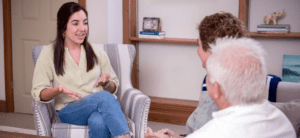Battling heart disease on all fronts: Holistic approach plus advanced techniques are improving outcomes for heart arrhythmia patients

Most Louisianans know our famous appetite for rich food and frequent parties puts us at greater risk for health problems including high cholesterol, high blood pressure and diabetes.
Less well known, though, is the most common type of heart arrhythmia that doubles a person’s risk for heart-related death and raises the chances of stroke five fold. Millions of Americans have the condition, yet many don’t know it.
Atrial fibrillation—AFib or AF for short—occurs when the upper and lower chambers of the heart aren’t quite in sync. People with the condition say it feels like their heart flip-flops, skips beats or bangs against their chest wall. Some get light-headed or nauseous or they gasp for air, while others have no symptoms at all.
More than 25,000 Americans died from AFib in 2018, and it was at least a contributing factor in another 175,000 deaths that year.
A team of providers at Our Lady of the Lake Heart & Vascular Institute, representing a wide variety of medical specialties and subspecialties, has pioneered a holistic approach to AFib care. Cardiology specialists, vascular and thoracic surgeons, neurologists and emergency medicine physicians collaborate so patients receive the best evidence-based care.
“There’s not a one-size-fits-all treatment that works for everyone,” said Paul Dampf, MD, an electrophysiologist who specializes in the electrical systems of the heart. “By working together across disciplines, we provide not only the latest and most advanced treatments, but a holistic approach that results in better outcomes for patients.”
In June the U.S. Food and Drug Administration approved a new, non-invasive surgical technique for persistent AFib that enables physicians to repair abnormal electrical signals in the heart. Making the repair via a catheter inserted through the groin up into the heart allows patients to heal faster than previously when open-heart surgery was required.
Known as a cryoablation PVI+, it’s the latest advanced technique in the arsenal at the Heart & Vascular Institute, which already holds accreditation for AFib care from the American College of Cardiology, the first and only hospital in Louisiana.

Our Lady of the Lake’s team approach helps AFib patients at every step of care, including:
• Heart attack patients in the Emergency Department are fast tracked for treatment, which includes promptly gathering and analyzing heart activity data to detect the presence of AFib;
• Sleep medicine doctors assess and treat sleep apnea, an underlying trigger for AFib;
• Bariatric & Metabolic Institute physicians address underlying weight and metabolic disorders to manage AFib.
September is National Atrial Fibrillation Awareness month, an ideal time to raise awareness of a treatable condition of which many people aren’t aware.
Living a healthy life with AFib begins with timely diagnosis and recognizing symptoms, which include:
• General fatigue
• Rapid and irregular heartbeat
• Fluttering or “thumping” in the chest
• Dizziness
• Shortness of breath and anxiety
• Weakness
• Faintness or confusion
• Fatigue when exercising
• Sweating
• Chest pain or pressure
AFib can trigger heart attacks, which typically cause chest discomfort; pain or discomfort in the arms, back, neck or stomach; and cold sweats or nausea.
AFib also can trigger a stroke, often causing facial drooping, arm weakness and speech difficulty, at which point it’s crucial to call 911 for help.
Click here to learn more about what Our Lady of the Lake’s Heart & Vascular Institute can do for you.













